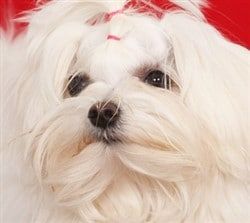When a Maltese Has a Runny Nose
Overview
One health issue that owners will almost immediately notice is when their Maltese has a nasal problem. This includes either a runny nose or a thicker nasal discharge.
We know that with humans, this can mean a lot of different things, ranging from a common cold to a sinus infection to allergies. So it is normal to be concerned when our dog shows symptoms such as these.
This section is going to discuss:
- Wet nose Vs dry nose
- All of the elements that may cause a Maltese to have a runny nose
- Other symptoms that may go along with this
- Steps that you can take to treat this at home
- Signs that your Maltese puppy or dog will need to be seen by a veterinarian
Let's dive into this topic, in detail, so that you will know what to do and how to care for your Maltese if he does indeed have some sort of nasal discharge.
Please note:
PetMaltese is reader-supported. Some of the product suggestions on this page are affiliate links. As an Amazon Associate we earn from qualifying purchases. This is at no extra cost to you and helps us continue creating useful content.
The Wet NoseVS Dry Nose Debate
The Wet Nose VS Dry Nose Debate
For quite a while, there was a very popular saying that a sign of good canine health was for the dog to have a cold, moist nose.
No one is sure where that saying came from, but we do know that it is not accurate. During the course of one day, a dog's nose may be warm, cool, dry and moist.
Without other symptoms, the temperature of the nose and whether it is dry or moist has no bearing on a dog's health.
When a Maltese licks his nose - as many dogs do to clean off food and whatnot - it may remain cool and moist for a bit.
Conversely, when a puppy or dog first wakes up in the morning the nose may tend to be dry.
Problems can arise, however, when a nose goes beyond just being moist and you can clearly see discharge running out of it. Some may refer to this as a runny nose, nasal drip or nasal discharge.
Clear Discharge
The most common type of runny nose will be a situation where the discharge is thin, watery and clear. A Maltese may lick at it as it runs down, making you wonder at first if the dog is simply licking himself more or if there is indeed a discharge.
If you keep a close eye on your dog, you will be able to determine which one is the case. It should be noted that if a dog has a runny nose, he may lick at the discharge so much that the tender leather may become chapped.
Without treatment for the chapped skin, it may worsen and become cracked. As more and more discharge runs over the cracks, it only exasperates the problem. At this point, there will be 2 concerns: the original problem of the discharge and chapping/cracking.
Chapped noses can be treated with over-the-counter products (more on this ahead) and with a clear discharge, you will want to take steps if it lasts for more than 3 days (more ahead as well).
Colored Discharge
When a runny nose produces a yellow or green discharge this usually points to an infection of some sort. Along with this, there may also be a foul smell. A Maltese may have trouble breathing, as nasal passages become congested and blocked off.
This may appear in just one nostril; however most of the time it will present in both.
Causes For Runny Noses with the Maltese Dog
There are quite a few reasons why a Maltese puppy or dog may suddenly develop a runny nose, ranging from easily treatable issues to very serious medical problems. Here we will look at the top reason by order of likelihood.
Allergies
Onset:
Some owners do not automatically think of allergies
as a cause because a dog may have never appeared to have an allergy in the past. However, two things should be noted:
1)
Canines can grow into allergies. A puppy that was never allergic to a thing may mature into an adult dog that has quite severe allergies. This is one reason why this cause should not be ruled out.
2)
A dog that otherwise was never allergic to anything may suddenly be showing a reaction because the trigger element was never in the environment in the past. For example, dust mites is a concern for many dogs; but, if the mites were not previously present or if they just recently grew in numbers, it may be at that time that a Maltese begins to have a runny nose.
Other Signs:
It is very common for a Maltese to only have the symptoms of a runny nose if allergic to something. With this said, there may also be one or more of the following signs:
- Itchiness - This may be on any part of the body, but with this breed it tends to develop on the paws, causing a Maltese to chew at the paws and paw pads, often to the point of ripping out hair and causing sores.
- Bloodshot, irritated eyes; there may also be some clear or yellow discharge in the eyes as well.
- Sneezing - As fluid builds up in the nose and then runs out of the nostrils, it will irritate the nasal passages and can cause sneezing.
- Wheezing/ Coughing - It is not uncommon for an allergic reaction to cause some respiratory issues such as trouble breathing
and/or coughing.
- Skin reactions - This includes hot spots, drying, peeling, and/or rash
Treatment:
This can be a bit tricky because a dog may be sensitive to host of elements. When a runny nose is clear and watery, this may be due to an environmental allergy (pollen, weeds, dust mites), a food ingredient, and/or a cleaning product or other inhaled or contact allergy.
Once you narrow down the trigger, treatment can be as easy as avoiding the culprit or a dog may need prescribed antihistamine medication and/or anti-inflammatory meds to bring symptoms under control.
Food ingredients
- It is often not an actual food, but rather an additive that causes issues. So, one of the first steps should be to reassess what you are feeding your Maltese.
For pollen and other airborne allergies, there are some steps that you can take at home to try and limit exposure to possible irritants:
1)
Keep the house well dusted, using a damp dusting cloth or product that traps dust.
2)
If you have carpeted surfaces, use a HEPA certified vacuum cleaner. This means that the machine will have an efficiency of at least 99.97% and will be capable of trapping particles that are as small as 0.3 micrometers.
3)
If you have a central air system, run the A/C or just the fan option while using HEPA certified filters to clean out the air.
4)
Wash all bedding (yours and your dog's), all clothing, and any other washable items in a washing machine on a warm setting (if possible) with hypoallergenic detergent and then dry fabrics on a hot setting (if possible).
5)
Replace a canine bed mattress or padding that is older than 2 years if it is not washable.
6)
Keep pollen out of the house by rinsing off your Maltese's paws whenever he enters back into the house and having everyone remove their shoes.
Teething for Pups or Dental Issues for Adult Maltese
It is not uncommon for a Maltese puppy to have a minor runny nose when cutting teeth. As milk teeth fall out and adult teeth are erupting up through the gums, this can cause a lot of secondary issues and a runny nose with clear discharge is one of them.
If your Maltese is indeed in the teething stage
and has no other symptoms other than a runny nose that runs clear, you may not need to do anything more than let it run its course.
If the nose becomes chapped, you will want to protect it by using a canine nose butter.
When an adult Maltese has a chronic runny nose, this may point to a problem with a tooth. Commonly this will be an infection in the tooth itself and sometimes in the surrounding gums. It may also be a matter of a cracked or chipped tooth.
Such high levels of irritation in the mouth can trigger the nose to run. Hopefully owners are providing regular dental care at home
along with professional cleanings; but even in these cases an issue may develop.
Signs of dental problems, along with the runny nose and discharge, may be reluctance to eat, restlessness and/or blood in the mouth.
Though in many cases the only signs will be the nasal discharge and for this reason, owners should not rule out the possibility of a tooth infection since it can cause such a high level of discomfort to a dog and can be rectified with professional treatment.
Ahead, we cover how to treat chapped, cracked noses.
Blockage in the Nasal Cavity
Sometimes the reason for a runny nose can be a simple blockage due to a foreign element. Most common is a blade of grass or a tiny bit of food, but dogs have been known to somehow get very strange objects lodged in a nostril.
In this case, the discharge will be coming from just one nostril and a Maltese may paw at the nose and/ or there may be some thin blood that drips out.
Owners can take a look with a flashlight (a helper is recommended); In some cases you will be able to pluck out the culprit with a tweezers but in other cases if the object is too far up the nasal canal, a veterinarian will need to extract it.
Nasal Infection
When the 4 common reasons listed above are not to blame, if the runny nose turns into one with a thicker, is colored and/or there is a smelly discharge, it may be time to look to the possibility of a nasal infection.
Professional treatment will be needed, as the vet will be the one to diagnose this and give treatment depending on the type of infection: bacterial, fungal, or viral.
A bacterial nasal infection will be treated with antibiotics and fungal nasal infections will be treated with anti-fungal medications. In general, viral infections will need to run their course, however with severe runny noses, veterinarian will often prescribe medication to help dry out the passages.
Noses should be protected with a a quality nose balm, and this is ahead under How to Treat Chapped or Cracked Noses
Polyps and Tumors
Rare, but still a possibility as a cause for a runny nose is a polyp or tumor growing in the nasal cavity. With this, you can often see a bump protruding from the nose. This may cause noisy breathing as well since since air will be drawn around the growth. Some dogs may develop a bloody nose as well.
Polyps are often easily removed; though it does require minor surgery. Maltese dogs that develop a polyp often will develop others later in life.
A tumor will need to be tested to see if it is cancerous. Benign tumors that cause runny noses will be surgically removed. With malignant tumors, surgery alone is not often enough and for that reason it will usually be recommended that the dog be given a course of radiation.
This is one health issue
that does not generally even cross the minds of owners; however it is a dangerous one for dogs. With canine nasal tumors, prognosis in generally not very good. Catching this early will be important; and for this reason, if your Maltese has a runny nose that will not clear up, discharge along with a bloody nose and/or a bump on the nose, do have this checked out ASAP.
Rare But Possible Reasons for a Runny Nose
One of the above issues is almost always the cause when a Maltese puppy or dog suddenly develops a runny nose. With that said, there are some other less common reasons and most of these are quite serious.
Distemper
- While vaccinations should prevent this, some dogs can catch this during the 'window of vulnerability', which is when the dam's milk has stopped giving the puppy protection but vaccinations are not yet fully protecting the pup.
Signs include runny nose, very sticky yellow colored nasal discharge, fever and/or trouble breathing. Some dogs may develop convulsions.
Treatment often includes a combination of medicines including anticonvulsants, antibiotics, sedatives, and painkillers.
Cleft palate
- This is a condition in which the cleft palate (the 2 sides of the palate) does not properly fuse together.
Signs are runny nose, coughing, trouble breathing, and weight loss. With some Maltese, there will be delayed growth and a puppy will be smaller size
than expected. If not treated, pneumonia may develop.
This is treated with oral and nasal surgery.
Oral Nasal Fistula
- This is a condition that most often affects young puppies. This term describes a condition in which the oral and nasal passages did not fuse together properly as a puppy was developing, causing a hole, or if injury has caused them to separate. In rarer cases, severe tooth decay can cause a fistula.
Signs include runny nose, bloody and/or pus-like nasal discharge and sneezing. These may worsen after eating. A Maltese puppy may also have bad breath. In some cases, a puppy may have a lot of trouble eating, which causes the pup to lose weight - sometimes to dangerous levels.
This is treated with oral and nasal surgery.
Rocky Mountain Spotted Fever - Many owners assume this is a rare, random disease that does not really affect a lot of dogs. However, this is the most common tick-borne disease to affect both canines and humans.
Signs are runny nose, nose bleeds, depression, weakness, discolored spots on the skin, blood in the urine, swelling in the limbs, trouble walking, and/or pain/swelling in the eyes.
Once confirmed via blood tests (and possible skin biopsy), a dog is often kept in an animal clinic to be monitored for the real danger of swelling on the brain. During that time, antibiotics will be given.
While this is extremely serious, if it is caught early and treatment is sought right away, prognosis is usually very good with most dogs fully recovering and living a long life.
How to Treat and Heal Chapped and/or Cracked Noses
It is amazing how much damage discharge can do. It starts with a dog licking the nose and then issues with chapping can quickly develop.
Each lick makes it worse and each outing that involves sun exposure, cold, or wind can exacerbate the problem.
To treat chapped and/or cracked noses, you will want to use a quality nose balm. The goal is for it to do 2 things: Protect the nose from further damage and heal current issues.
Since dogs would be highly disturbed by a scent right on their nose, be sure to use one that is fragrance-free.
One of the most effective nose balms is Natural Dog Company's Snout Soother . This should be applied 3 times per day to heal issues and then once a week to keep the nose in good shape. When you dab it on your Maltese's nose, distract him from immediately licking it off by offering him a treat or placing a tiny bit of peanut butter on his paw.
. This should be applied 3 times per day to heal issues and then once a week to keep the nose in good shape. When you dab it on your Maltese's nose, distract him from immediately licking it off by offering him a treat or placing a tiny bit of peanut butter on his paw.
Be sure that the last application of the day is once your Maltese is settled down for the night and is right about to go to sleep.
If any cracks start bleeding or is there is any pus-like discharge, this is something that will need to be treated by the veterinarian.
Summary
While a runny nose may be acute and go away in a couple of days, if it lasts for more than 3 days, it will be time to take steps to find the cause.
While most runny noses can be attributed to seasonal allergies or other reactions, there are some serious health issues in which this is a common symptom. As always, it is best to play it safe and seek professional veterinary care when in doubt about any potential health problem with your Maltese puppy or dog.

-min-450x169-1920w.jpg)


